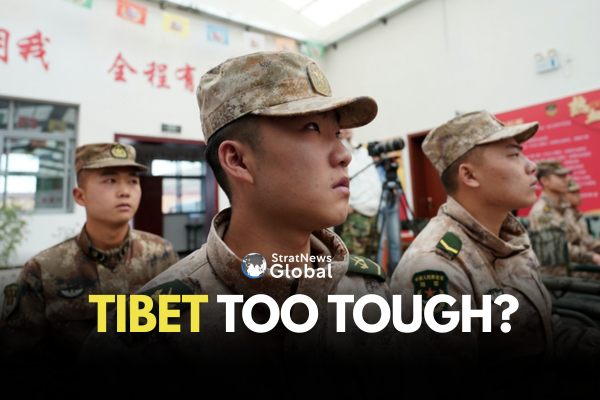Chinese netizens are engaged in a divisive debate over a young soldier punished for refusing to serve in a Tibet-based People’s Liberation Army (PLA) brigade. The incident has become a trending topic on Chinese social media platforms like Weibo, drawing millions of views.

The soldier, identified as Huang Moumou, a university graduate from Guangzhou, had voluntarily enlisted in March 2025 but, according to his service records, showed “a negative attitude” after being assigned to Tibet. Despite repeated counselling, Huang could not adapt and was thrown out of the army.
He was fined the yuan equivalent of around $4000, stripped of family benefits, and permanently barred from public employment, overseas travel, and higher education. Details of his failed army career will also remain recorded in his household registration and personal credit file, branding him a military defaulter for life.
Tibet Posting : A Symbol of Hardship
Was Huang’s case a simple one of military disobedience? Online reactions focused on a deeper issue: fear of being stationed in Tibet, one of the most demanding postings in the Chinese military.
One viral comment summed it up:“He probably saw that he was being sent to Tibet and didn’t want to endure hardship.”
Tibet, known for its high altitude, freezing winds, and isolation, is seen as one of the toughest postings in the PLA. The state media calls it heroic but many young Chinese recruits differ.
Comments flooded Weibo. While some posts joked about it, others offered advice on how to avoid going there. Get a tatto recommended a verified account adding that “If someone really doesn’t want to serve, they can easily avoid it during the medical check-up, pretend you can’t read the eye chart or show a small tattoo, and you’ll be excused.” (Screenshot below)

But there are always the “Little Pinks” — young, loyal supporters of China’s Communist Party (CCP). They are known for jumping into online debates to defend the government and the PLA.
One Little Pink wrote: “Huang Moumou has been expelled and permanently marked for refusing military service, banned from public exams for life. The red line of the law is not a joke, think carefully before making such choices.”
But many young users were worried about the harsh life in Tibet, not the law. One comment ran “I want to join the army, but I’m afraid of the hardships.”
The posts showed that while the nationalists still rule online talk, young people are risking punishment to make known their views on serving in Tibet. But few dared to defend him openly, their understated comments indicating a deeper unease with what the military demands from its recruits.
The wider trend on Weibo suggests that China’s youth are increasingly reluctant to join the PLA. To many, army life especially in remote regions like Tibet and Xinjiang, feels harsh, distant and too controlling. What older generations saw as an honour now seems more like a hard bargain: long separations, freezing weather, and limited personal freedom.
Young Chinese, raised in an age of digital comfort and city life, often struggle to accept the strict discipline and hardships that define the PLA particularly in places like Tibet, where conditions test both the body and the mind. Some netizens argued that voluntary enlistment should come with stronger psychological support, saying that patriotic slogans alone cannot sustain morale in such environments.
The story reflects a generational divide between a government demanding loyalty and sacrifice, and a younger population more focused on mental health, comfort, and personal choice.
Research Associate at StratNewsGlobal, A keen observer of #China and Foreign Affairs. Writer, Weibo Trends, Analyst.
Twitter: @resham_sng





